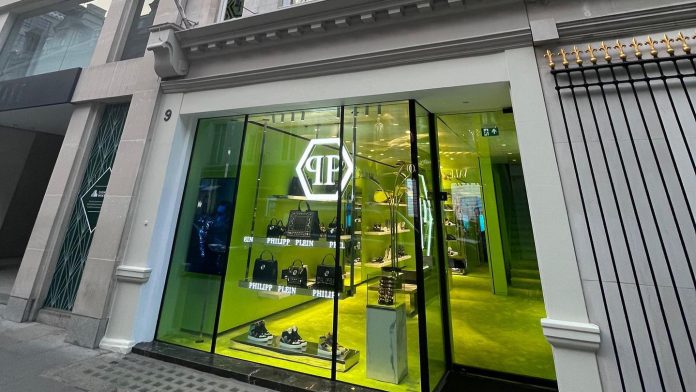What Happened: As brands rush to buy up real estate in the metaverse, Philipp Plein is bringing a piece of the metaverse to the physical world. On April 28, the German luxury designer launched his new “crypto concept store” at his London flagship, enabling customers to pay for products in 25 leading digital currencies such as Bitcoin and Ethereum. If successful, the idea will be rolled out to his 100 other outlets around the world in the next two weeks.
Additionally, Plein is opening what he calls the MONA (Museum of NFT Art) above the store’s main retail selling space, described as the first physical art gallery of the metaverse. There, customers can view a projection of Plein Plaza (a $1.4 million piece of virtual land in Decentraland), create their own avatars, or shop from the brand’s NFT marketplace. Featuring pieces from Plein’s collaboration with visual artist Antoni Tudisco, the space is designed to be a “cultural, artistic, fashion and futuristic hub.”
Philipp Plein’s NFT art gallery features physical sculptures of his “Lil Monster Gang” NFT collection. Photo: Philipp Plein
The Jing Take: Clearly, Philipp Plein is not afraid to take the lead on all things digital. Earlier this year, his company released NFTs of his Plein Sport sneakers and the Lil Monster Gang collection, which raked in roughly €1 million over the last three months. In fact, the owner of Philipp Plein International Group told Fashion Network that out of €100 million generated from online retail last year, about three percent of that came from crypto — and he plans to double that in 2022.
Now, after becoming the first luxury fashion company to accept crypto payments last year, Philipp Plein is extending this experience to brick-and-mortar stores. But while this is cool in theory, it’s not without challenges. For one, the value of digital currencies can change as quickly as every few minutes, meaning Plein’s crypto prices must be updated constantly. Moreover, crypto payments are slower than cash or credit cards, typically taking three to five minutes to complete a transaction, which could be cumbersome to consumers.
What more brands could end up doing instead is replicating Plein’s NFT art museum in their own flagships. With so many luxury players churning out digital collections, having a physical gallery to display them could not only help educate clients on the metaverse but also give them the option to purchase NFTs by traditional cash or card, making them more accessible. This could be especially useful in China, where cryptocurrencies are banned but NFT interest abounds. From hosting a blockchain-based art exhibition in Beijing last April to opening a 24-hour NFT gallery in Chengdu in October, the country has demonstrated an appetite for digital art that Philipp Plein and others could leverage with these innovative retail experiences.
The Jing Take reports on a piece of the leading news and presents our editorial team’s analysis of the key implications for the luxury industry. In the recurring column, we analyze everything from product drops and mergers to heated debate sprouting on Chinese social media.
Credit: Source link






















 Bitcoin
Bitcoin  Ethereum
Ethereum  Tether
Tether  Solana
Solana  USDC
USDC  Lido Staked Ether
Lido Staked Ether  XRP
XRP  Dogecoin
Dogecoin  Toncoin
Toncoin  Cardano
Cardano  Shiba Inu
Shiba Inu  Avalanche
Avalanche  TRON
TRON  Wrapped Bitcoin
Wrapped Bitcoin  Bitcoin Cash
Bitcoin Cash  Polkadot
Polkadot  Chainlink
Chainlink  NEAR Protocol
NEAR Protocol  Polygon
Polygon  Internet Computer
Internet Computer  Litecoin
Litecoin  Uniswap
Uniswap  LEO Token
LEO Token  Dai
Dai  First Digital USD
First Digital USD  Hedera
Hedera  Stacks
Stacks  Ethereum Classic
Ethereum Classic  Aptos
Aptos  Mantle
Mantle  Cronos
Cronos  Cosmos Hub
Cosmos Hub  Stellar
Stellar  OKB
OKB  Filecoin
Filecoin  Render
Render  Immutable
Immutable  Renzo Restaked ETH
Renzo Restaked ETH  XT.com
XT.com  Pepe
Pepe  Bittensor
Bittensor  Arbitrum
Arbitrum  dogwifhat
dogwifhat  Maker
Maker  The Graph
The Graph  Wrapped eETH
Wrapped eETH  Optimism
Optimism 
